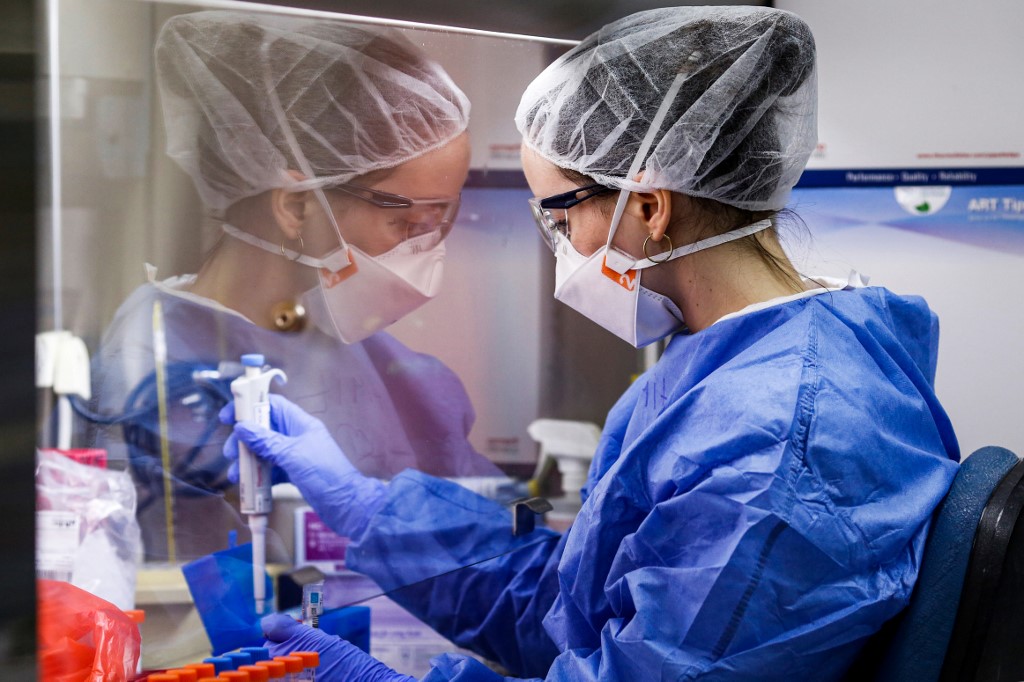
A medical worker tests samples of suspected COVID-19 coronavirus cases at the Maccabi Health Services laboratory in Israel’s central city of Rehovot on May 27, 2020. – Israeli HMO Maccabi operates one of the biggest automated medical labs in the world that performs several thousand tests per day, where numerous and diverse tests are performed with no human intervention. Results are transferred directly to the referring physician’s computer and recorded in each member’s computerised medical record, usually in less than 24 hours. (Photo by GIL COHEN-MAGEN / AFP)
Israel has launched a campaign to test 100,000 people for novel coronavirus antibodies as the country prepares for a possible “second wave” of cases, a top official said Thursday.
The initiative is one of the world’s largest such schemes and aims to test Israel’s “collective immunity” against COVID-19.
“We have started… It should not be too long before we see some interesting trends,” said Yair Schindel, a senior official on the government’s task force tackling the pandemic.
The government is trying to determine how widely the virus has spread and who is most at risk going forward.
In parallel to the national campaign, authorities are also running separate surveys of “high-risk areas”.
Israel’s ultra-Orthodox Jewish community has been particularly hard-hit by the pandemic, while other focus groups include hospital staff treating coronavirus patients.
“We need to understand how many of them were actually exposed and created antibodies,” said Schindel, who co-founded aMoon, a venture capital firm specializing in biomedical start-ups.
The World Health Organization, however, said last month there is no evidence that those who have recovered from COVID-19 are protected from future infection.
Low death rate
Israel has gradually relaxed its anti-coronavirus measures in recent weeks, reopening schools, beaches and restaurants.
The country has registered 281 deaths from COVID-19 and more than 16,800 cases in a population of around nine million, according to official figures.
But despite Israel faring relatively well compared to some countries, the government is already preparing for a spike in cases that could hit this winter or even sooner.
The government has bought around 2.5 million tests for the antibodies scheme, Schindel said.
These are being distributed to the country’s four health insurance companies, before the samples are brought together for analysis.
“I have not heard about another large-scale national survey yet,” said Schindel.
Israel’s blood testing scheme, which Schindel hoped would be taken up by other countries, was first revealed earlier this month by the New York Times newspaper.
Around 70 percent of Israel’s novel coronavirus infections are linked to a case from the United States, according to a Tel Aviv University study, while the rest can be traced to European cases.
Israel enforced strict measures at the start of the pandemic, shutting its borders to visitors and ordering residents to stay at home.
The use of telemedicine, allowing healthcare workers to monitor patients from a distance, also had a positive impact, according to specialists who spoke to AFP.
“Another thing that is unique… is that the Israeli population is very used to going from routine day-to-day to an emergency situation,” said Schindel.
“Usually it is not because of a pandemic, it is because we have missiles coming in,” he added, referring to rockets fired by Palestinian militants from Gaza.
The enclave has been under a crippling Israeli blockade for more than a decade.